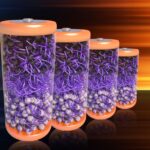 Researchers at University College London have developed high-performing indoor solar cells that capture ambient light to power small devices like remote controls and sensors—without the need for batteries. By utilising perovskite materials, these cells can absorb a broader range of light wavelengths, sidestepping the indoor limitations of traditional silicon-based cells.
Researchers at University College London have developed high-performing indoor solar cells that capture ambient light to power small devices like remote controls and sensors—without the need for batteries. By utilising perovskite materials, these cells can absorb a broader range of light wavelengths, sidestepping the indoor limitations of traditional silicon-based cells.
The team tackled long-standing issues such as efficiency losses caused by electron traps and material degradation. Through smart chemical enhancements, they significantly reduced defects, boosting both performance and lifespan. In fact, these cells deliver roughly six times the efficiency of current indoor alternatives and promise durability that could extend beyond five years.
Dr Mojtaba Abdi Jalebi from the UCL Institute for Materials Discovery explained, “Billions of devices rely on small amounts of energy—and constantly replacing batteries isn’t a sustainable practice. As the Internet of Things grows, this solution becomes even more critical.”
The researchers achieved this by adding rubidium chloride to encourage a uniform crystal growth, effectively minimising charge traps. Lead researcher Siming Huang likened their method to reassembling a sliced cake, allowing electric charge to flow more freely through the structure.
In tests, the solar cells reached a record 37.6% efficiency in converting indoor light (at 1,000 lux) into electricity. They also maintained strong performance, retaining 92% of their initial efficiency over 100 days and 76% after 300 hours under intense conditions.
This breakthrough could pave the way for cost-effective, print-ready solar cells that not only power your devices more sustainably but also ease the hassle of frequent battery replacements.








